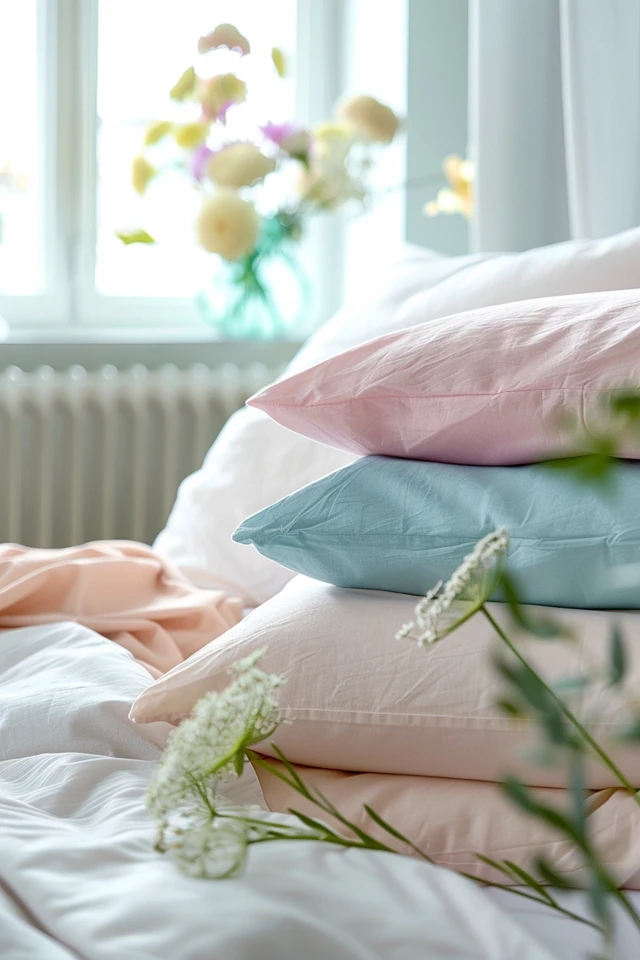Pilling can be a pesky issue that affects the comfort and appearance of your sheets. Those tiny fuzz balls and rough texture not only make your sheets look worn out but can also disrupt your sleep experience. Luckily, there are a few maintenance tips that can help you prevent pilling and keep your bedding in top condition.
The formation of pills occurs when the fibers in your sheets break down and tangle. Fabrics made from multi-ply short fibers are more likely to pill, while longer, single-ply fibers such as Egyptian cotton or bamboo are less prone to pilling. Cotton sheets made from long-staple fibers like Pima and Egyptian cotton are more durable and resist pilling better than short-staple or blended cotton. Bamboo sheets, with their tightly woven threads, are also more resistant to pilling. On the other hand, flannel sheets can be prone to pilling due to their loosely woven fibers.
Several factors contribute to pilling, including friction, low-quality fabric, high washing temperatures, and additional wear and tear. But don’t worry, there are steps you can take to prevent pilling and maintain the quality of your sheets.
Key Takeaways:
- Choose high-quality sheets made of materials like Egyptian cotton, Pima cotton, percale, linen, or bamboo.
- Follow the manufacturer’s care instructions, including washing with cool water and gentle detergents.
- Dry your sheets at low temperatures or consider line drying.
- Rotate and flip your sheets regularly to distribute wear.
- Consider replacing your sheets every two to three years or every 100 washes.

How to Prevent Pilling in Sheets
To maintain the quality of your bed sheets and avoid fabric pilling, it’s important to follow a few simple steps. By choosing the right materials, properly caring for your sheets, and implementing smart practices, you can prevent cotton sheets from pilling and ensure their longevity.
Choose High-Quality Sheets
Start by selecting sheets made of natural materials with long, single-ply, tightly woven fibers. Egyptian cotton and Pima cotton are excellent choices, offering durability and resistance to pilling. Look for sheets with a thread count of 400-700 to ensure their high quality and longevity. Percale sheets with a thread count of 200-300 can also provide a smooth and pill-resistant sleeping experience.
Linen sheets, with their longer and loosely woven fibers, are naturally more resistant to pilling. Consider linen sheets with a thread count of 80-150 for optimal comfort and durability. Another option is bamboo sheets, which have a thread count of around 300 and provide a soft and resistant sleeping surface without the risk of pilling.
Proper Washing and Drying
To prevent pilling, it’s essential to follow the manufacturer’s care instructions. Wash your sheets with cool water and gentle detergents specifically designed for delicate fabrics. Avoid using hot temperatures and harsh detergents, as they can accelerate fiber breakdown and contribute to pilling. Additionally, line drying your sheets can help them last longer and maintain their quality.
Rotate and Flip Regularly
To distribute wear evenly and prevent pilling in specific areas, it’s a good practice to rotate and flip your sheets regularly. By alternating the sides you sleep on and switching the head and foot of the bed, you can ensure that your sheets experience equal use, preventing localized pilling.

Remove Pills if Needed
If your sheets do happen to develop small fuzz balls or pills, don’t worry. You can easily remove them using a fabric shaver or a pair of scissors. Gently glide the fabric shaver over the surface of your sheets to remove the pills, or carefully snip them off with scissors. Be cautious not to cut the fabric itself, as this can cause further damage.
By adhering to these simple steps, you can maintain the quality of your bed sheets, prevent pilling, and enjoy a comfortable and durable sleep experience night after night.
When Should I Look for New Sheets?
Pilling is a common issue that can indicate it’s time to consider purchasing new sheets. Generally, sheets should be replaced every two to three years or after approximately 100 washes to maintain optimal comfort and quality. Excessive pilling, along with visible rips or tears, stubborn stains, or lingering odors, are clear signs that it’s time to bid farewell to your old sheets and invest in new ones.
When shopping for new sheets, it’s important to consider the material, weave, and thread count to ensure their longevity and resistance to pilling. Opt for high-quality sheets crafted from durable and pill-resistant materials such as Egyptian cotton, Pima cotton, percale, or linen. Egyptian cotton and Pima cotton are known for their finer and longer fibers, which contribute to the overall durability of the sheets. Linen sheets, on the other hand, offer longer and loosely woven fibers that make them naturally more resistant to pilling.
Thread count also plays a crucial role in the quality of your sheets. Aim for a thread count between 300 to 600 for Pima cotton sheets and 200 to 300 for percale sheets. Linen sheets, which have a more relaxed weave, should ideally have a thread count ranging from 80 to 150. If you prefer a sustainable option, bamboo sheets with their long fibers are also an excellent choice to extend the lifespan of your sheets.
By carefully selecting the right sheets and practicing proper maintenance, you can significantly extend their lifespan and minimize the occurrence of pilling. Remember to always follow the manufacturer’s care instructions, including using gentle detergents and washing with cool water. Taking these proactive steps will not only ensure the longevity of your sheets but also enhance your sleeping experience for years to come.


